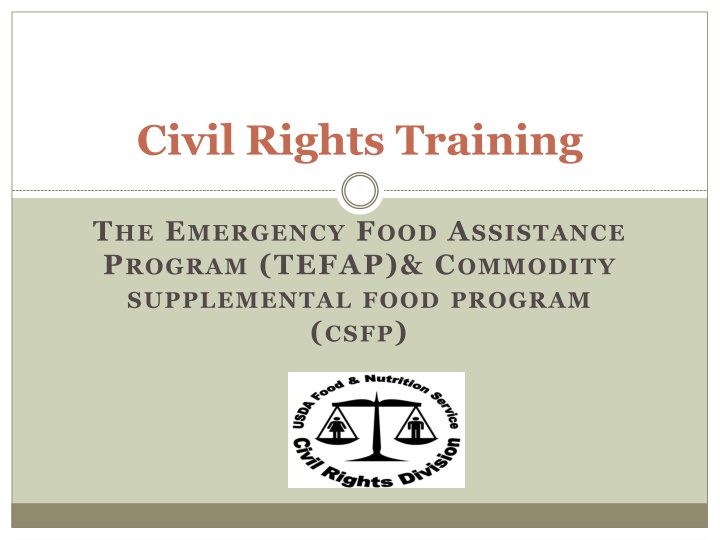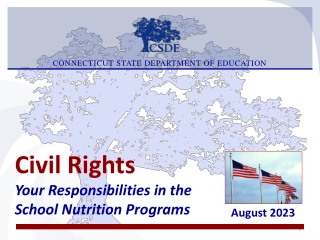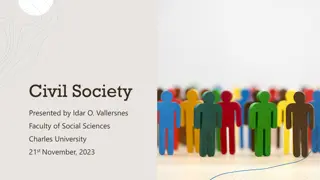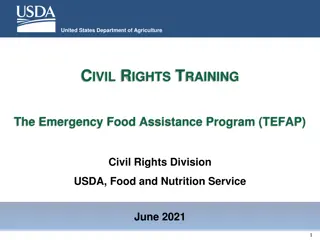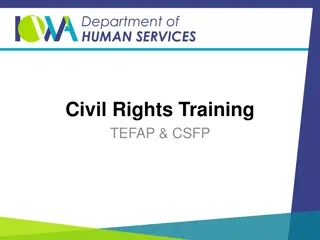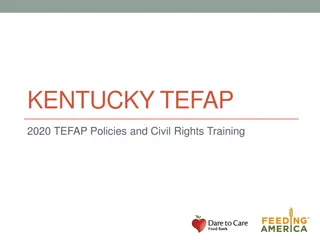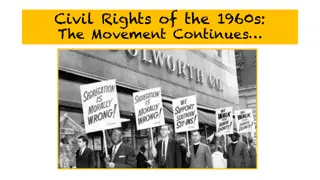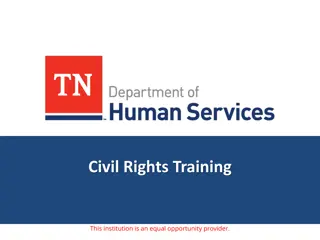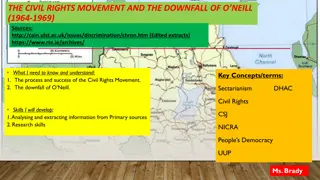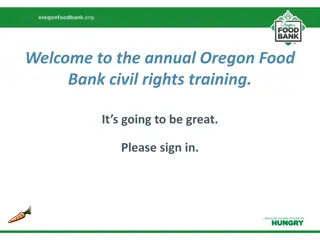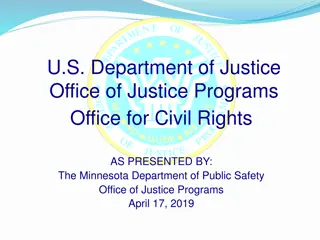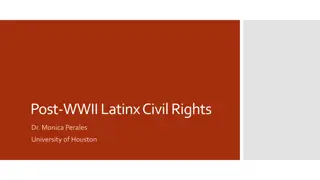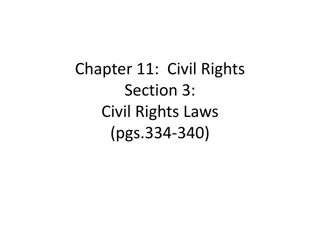Civil Rights Training for TEFAP & CSFP
This training covers civil rights coverage, legal authorities, compliance areas, complaint procedures, racial data collection, limited English proficiency, and more. Understand the concepts of stereotyping, prejudice, and discrimination, as well as the legal authorities governing civil rights in programs receiving federal assistance.
Download Presentation

Please find below an Image/Link to download the presentation.
The content on the website is provided AS IS for your information and personal use only. It may not be sold, licensed, or shared on other websites without obtaining consent from the author.If you encounter any issues during the download, it is possible that the publisher has removed the file from their server.
You are allowed to download the files provided on this website for personal or commercial use, subject to the condition that they are used lawfully. All files are the property of their respective owners.
The content on the website is provided AS IS for your information and personal use only. It may not be sold, licensed, or shared on other websites without obtaining consent from the author.
E N D
Presentation Transcript
Civil Rights Training THE EMERGENCY FOOD ASSISTANCE PROGRAM (TEFAP)& COMMODITY SUPPLEMENTAL FOOD PROGRAM (CSFP)
Agenda 2 Civil Rights coverage and legal authorities Areas of compliance Assurances Public notification requirements Complaints of discrimination Civil Rights training Racial and Ethnic Data Collection (CSFP Only) Limited English Proficiency (LEP) Disability Equal opportunity for religious organizations Compliance reviews and resolution of noncompliance Customer Service and Conflict Resolution Sample Scenarios Questions/open discussion
Civil Rights 3 The rights of personal liberty guaranteed to U.S. citizens by the 13th and 14th Amendments of the Constitution and Acts of Congress Terms civil rights and equal employment opportunity (EEO) are not interchangeable
Civil Rights Concepts 4 Stereotyping Preconceived beliefs or over-simplified generalizations about a particular group Prejudice A set of rigid and unfavorable attitudes toward a particular group that is formed without considering facts Discrimination The practice of treating people differently because of how we have grouped them in our minds according to our prejudices
Legal Authorities 5 Programs and activities receiving federal financial assistance must abide by Civil Rights requirements Title VI of the Civil Rights Act of 1964 prohibits discrimination based race, color, national origin Title IX of the Education Amendments of 1972 prohibits discrimination based on sex Americans with Disabilities Act (ADA)/Americans with Disabilities Act Amendments Act (ADAAA) and Section 504 of the Rehabilitation Act of 1973 prohibit discrimination based on disability Age Discrimination Act of 1975 prohibits discrimination based on age Civil Rights Restoration Act of 1987 clarifies the scope of the Civil Rights Act of 1964
Legal Authorities 6 USDA codified these laws into departmental Civil Rights regulations at 7 CFR 15, subparts a f Food and Nutrition Service (FNS) followed by developing FNS Instruction 113-1, Civil Rights Compliance and Enforcement Nutrition Programs and Activities Civil Rights requirements are also incorporated into program regulations TEFAP: 7 CFR 250, 251 CSFP: 7CFR 247
What is discrimination in TEFAP/CSFP? 7 Treating program applicants or participants differently based on one or more protected class(es) Protected classes in TEFAP/CSFP include Race Color National origin Language Disability Reasonable accommodation Age Sex
Assurances 8 A contractual agreement in which a State agency, local agency, or other subrecipient (i.e. TEFAP/CSFP food pantry) legally agrees to administer FNS program services and benefits in accordance with all laws, regulations, instructions, policies and guidance related to nondiscrimination in program delivery An assurance must be included in all agreements between Federal/State agencies and State/local agencies and subrecipients
Public Notification 9 All FNS programs (i.e. TEFAP/CSFP) must include a public notification system Elements of public notification Program availability Complaint information Nondiscrimination statement
Public Notification 10 Program availability Inform applicants, participants and potentially eligible persons of their program rights and responsibilities and the steps necessary for participation Complaint information Advise applicants and participants at the service delivery point of their right to file a complaint, how to file a complaint and the complaint procedures Nondiscrimination statement All information materials and sources, including websites, must contain a nondiscrimination statement
Public Notification 11 Methods Prominently display the USDA nondiscrimination poster, And Justice For All Inform potentially eligible people, applicants, participants, and grassroots organizations of the program and its requirements Provide appropriate information in alternative formats for people with disabilities Include the nondiscrimination statement on all appropriate program materials provided to the public Convey the message of equal opportunity in all photographic and other graphics that are used to provide program-related information to the public
Public Notification 12 Nondiscrimination statement Full version In accordance with Federal civil rights law and U.S. Department of Agriculture (USDA) civil rights regulations and policies, the USDA, its Agencies, offices, and employees, and institutions participating in or administering USDA programs are prohibited from discriminating based on race, color, national origin, sex, disability, age, or reprisal or retaliation for prior civil rights activity in any program or activity conducted or funded by USDA. Persons with disabilities who require alternative means of communication for program information (e.g. Braille, large print, audiotape, American Sign Language, etc.), should contact the Agency (State or local) where they applied for benefits. Individuals who are deaf, hard of hearing or have speech disabilities may contact USDA through the Federal Relay Service at (800) 877-8339. Additionally, program information may be made available in languages other than English. To file a program complaint of discrimination, complete the USDA Program Discrimination Complaint Form, (AD-3027) found online at: http://www.ascr.usda.gov/complaint_filing_cust.html, and at any USDA office, or write a letter addressed to USDA and provide in the letter all of the information requested in the form. To request a copy of the complaint form, call (866) 632-9992. Submit your completed form or letter to USDA by: (1) mail: U.S. Department of Agriculture Office of the Assistant Secretary for Civil Rights 1400 Independence Avenue, SW Washington, D.C. 20250-9410; (2) fax: (202) 690-7442; or (3) email: program.intake@usda.gov. This institution is an equal opportunity provider.
Public Notification 13 Nondiscrimination statement Short version This institution is an equal opportunity provider. Esta instituci n es un proveedor que ofrece igualdad de oportunidades. (Spanish) *Can be used in special circumstances only Translations Other languages are forthcoming
Public Notification 14 Nondiscrimination statement Full version (Spanish) De conformidad con la Ley Federal de Derechos Civiles y los reglamentos y pol ticas de derechos civiles del Departamento de Agricultura de los EE. UU. (USDA, por sus siglas en ingl s), se proh be que el USDA, sus agencias, oficinas, empleados e instituciones que participan o administran programas del USDA discriminen sobre la base de raza, color, nacionalidad, sexo, discapacidad, edad, o en represalia o venganza por actividades previas de derechos civiles en alg n programa o actividad realizados o financiados por el USDA. Las personas con discapacidades que necesiten medios alternativos para la comunicaci n de la informaci n del programa (por ejemplo, sistema Braille, letras grandes, cintas de audio, lenguaje de se as americano, etc.), deben ponerse en contacto con la agencia (estatal o local) en la que solicitaron los beneficios. Las personas sordas, con dificultades de audici n o discapacidades del habla pueden comunicarse con el USDA por medio del Federal Relay Service [Servicio Federal de Retransmisi n] al (800) 877-8339. Adem s, la informaci n del programa se puede proporcionar en otros idiomas. Para presentar una denuncia de discriminaci n, complete el Formulario de Denuncia de Discriminaci n del Programa del USDA, (AD-3027) que est disponible en l nea en: http://www.ascr.usda.gov/complaint_filing_cust.html y en cualquier oficina del USDA, o bien escriba una carta dirigida al USDA e incluya en la carta toda la informaci n solicitada en el formulario. Para solicitar una copia del formulario de denuncia, llame al (866) 632-9992. Haga llegar su formulario lleno o carta al USDA por: (1) correo: U.S. Department of Agriculture Office of the Assistant Secretary for Civil Rights 1400 Independence Avenue, SW Washington, D.C. 20250-9410; (2) fax: (202) 690-7442; o (3) correo electr nico: program.intake@usda.gov. Esta instituci n es un proveedor que ofrece igualdad de oportunidades.
And Justice For All Poster 15 New posters are in the design/printing phase Posters will be shipped directly to States when printed (based on the orders received in September 2015) All sites must display posters in a prominent location for all to view AD-475A New required version for TEFAP/CSFP Poster icon on this slide will change to reflect current NDS and new graphic
Complaints of Discrimination 16 Applicants or participants allege different treatment based on the protected class(es) Race Color National origin Age Sex Disability
Complaints of Discrimination 17 Types of Discrimination: Differential Treatment refusing service or using different eligibility criteria for certain applicants Disparate Impact discrimination that is not intentional, but has that effect Reprisal/Retaliation negative treatment of someone because they filed a complaint
Complaints of Discrimination 18 Complaint procedures When a complaint is received at the State or local level, it must be forwarded to FNS Civil Rights Division (CRD) within 5 business days of receipt FNS CRD processes the complaint from intake phase to investigation to closure Confidentiality at all levels is extremely important Complaint log Civil Rights complaints must be maintained in a log separate from other program complaints
Complaints of Discrimination 19 Additional information Applicants and participants must file within 180 days of the alleged action USDA complaint form English version: http://www.ocio.usda.gov/sites/default/files/docs/201 2/Complain_combined_6_8_12.pdf Spanish version: http://www.ocio.usda.gov/sites/default/files/docs/201 2/Spanish_Form_508_Compliant_6_8_12_0.pdf
Civil Rights Training 20 Required so that people involved in all levels of program administration understand Civil Rights-related laws, regulations, procedures and directives Local agencies responsible for training their staff and subrecipients on an annual basis Includes frontline staff and those who supervise frontline staff Frontline staff includes, but not limited to, food pantry workers, recruiters, reviewers, supervisors of frontline staff, volunteers* New staff must receive Civil Rights training before participating in TEFAP/CSFP activities *Volunteers (if any) must also receive training appropriate for their roles and responsibilities
Civil Rights Training 21 Training requirements for volunteers Frontline volunteers, such as individuals who regularly interact with program applicants and participants, determine eligibility, or handle personal information Must receive full Civil Rights training on an annual basis Training must first occur during each individual s orientation to the program(s) Volunteers who do not handle personal information and who may infrequently interact with program applicants, participants, or frontline staff Must receive, at a minimum, limited Civil Rights training which covers customer service and any other subject matter applicable to each volunteer s role and responsibilities Training must first occur during volunteers orientation to the program(s) and through refresher training as needed Volunteers who do not interact in any way with program applicants and participants and who do not handle personal information No Civil Rights training required
Civil Rights Training 22 Required areas of training for frontline staff Assurances Public notification Complaints of discrimination Civil Rights training Limited English Proficiency (LEP) Disability compliance (reasonable accommodation) Compliance reviews and resolution of noncompliance Conflict resolution Customer service
Racial and Ethnic Data Collection CSFP ONLY 23 The State agency must establish a system for collecting and maintaining racial or ethnic participation data. Recording the racial or ethnic identification of applicants and participants may include the utilization of self-identification where a written application is required. Other methods of recording such data may include card files, rosters, logbooks, or any written record used by local agencies or other subrecipients. (FNS Instruction 113-1, Appendix C) Use Form FNS-191, Racial or Ethnic Group Participation Commodity Supplemental Food Program, to record and submits to FNS racial or ethnic participation data for CSFP households.
Racial and Ethnic Data Collection CSFP ONLY 24 Applicants shall be assured that the information is required for and used for statistical purposes only and has no effect on eligibility criteria. Data should be collected at the point of application and retained at the service delivery area.
Racial and Ethnic Data Collection CSFP ONLY 25 Two Question Format Two Question Format 1. Ethnicity (must select one of the following) Hispanic or Latino Not Hispanic or Latino 2. Race (one or more of the following) American Indian or Alaskan Native Asian Black or African American Native Hawaiian or Other Pacific Islander White
Limited English Proficiency (LEP) 26 Who are persons with LEP? Individuals who do not speak English as their primary language and who have a limited ability to read, speak, write, or understand English because of their national origin Recipients of Federal financial assistance must take reasonable steps to ensure meaningful access to their programs and activities by persons with LEP Failure to provide meaningful access could be discrimination on the basis of national origin
Limited English Proficiency (LEP) 27 Factors included in assuring meaningful access The number or proportion of LEP people eligible to be served or likely to be encountered by the program The frequency with which LEP individuals come in contact with the program The nature and importance of the program, activity, or service provided by the program to people s lives The resources available to the recipient and costs
Limited English Proficiency (LEP) 28 Language services Applicants and participants cannot be asked to bring their own interpreters Children should not be used as interpreters Examples of language services Bilingual staff Telephone interpreter lines Oral interpretation services Written translation services Community organizations
Limited English Proficiency (LEP) 29 US Dept. of Justice ISpeak Cards: www.lep.gov Population data sources U.S. Census data http://www.census.gov/2010census/data/ American Community Survey http://www.census.gov/acs Migration Policy Institute s National Center on Immigrant Integration Policy http://www.migrationpolicy.org/
Disability Compliance 30 What is the definition of disability ? A person who has a physical or mental impairment which substantially limits one or more major life activities, has a record of such an impairment, or is regarded as having such an impairment Major life activity means functions such as caring for oneself, performing manual tasks, walking, seeing, hearing, speaking, breathing, learning and working functions of the immune system, normal cell growth, digestive, bowel, bladder, neurological, brain, respiratory, circulatory, cardiovascular, endocrine, and reproductive functions. (ADAAA 2008)
Disability Compliance 31 State and local offices must provide reasonable accommodations to applicants and participants with disabilities when necessary. Reasonable accommodations Provide the same level of service to applicants and participants in an alternative way Require good communication between all involved parties Must be funded through State/local offices, not by applicants and participants
Disability Compliance 32 Examples of reasonable accommodations Designated proxy Telephone interviews Home visits Captioning or Computer-Assisted Real-time Technology (CART) services for deaf or hard of hearing clients Sign language interpreters Reader services for blind or visually-impaired clients Any kind of alternative arrangement for service
Equal Opportunity for Religious Organizations 33 Faith-based and community-based organizations (FBOs and CBOs) participate in FNS programs through agreements with States, or through other local agencies that have agreements with States Nutrition assistance program policy encourages the participation of FBOs/CBOs on an equal footing with other kinds of local cooperating organizations, and avoids barriers that would make their participation difficult.
Equal Opportunity for Religious Organizations 34 7 CFR Part 16 ensures a level playing field for the participation of FBOs and CBOs in FNS programs by: Prohibiting discrimination for or against an organization on the basis of religion, religious belief, or religious character in the administration or distribution of Federal funds Allowing a religious organization that participates in USDA programs to retain its independence and continue to carry out its mission, provided that direct USDA funds do not support any inherently religious activities such as worship, religious instruction, or proselytization Clarifying that faith-based organizations can use space in their facilities to provide USDA-funded services without removing religious art, icons, scriptures, or other religious symbols Ensuring that no organization that receives direct financial assistance from the USDA can discriminate against a program beneficiary, or prospective beneficiary, on the basis of religion or religious belief
Compliance Reviews 35 Examine the activities of State agencies, local agencies, and subrecipients to determine Civil Rights compliance FNS Civil Rights and Program staff review State agencies. FNS staff and State agencies review local agencies and subrecipients. Significant findings must be provided in writing to the reviewed entity. Three types of Civil Rights compliance reviews Preaward reviews Postaward (routine) reviews Special reviews
Compliance Reviews 36 Preaward reviews State and local agencies must be in compliance with Civil Rights requirements prior to approval for Federal financial assistance Usually conducted as desk reviews Reports must be maintained in appropriate program files.
Compliance Reviews 37 Postaward (routine) reviews FNS and State agencies must conduct routine compliance reviews as identified by FNS Instruction 113-1 and program-specific regulations and policies Assess all of the Civil Rights compliance areas Sample post-award review questions Do printed materials contain the nondiscrimination statement? Is the And Justice For All poster displayed appropriately? Are program informational materials available to all? How are applicants and participants advised of their right to file a Civil Rights complaint of discrimination? Has annual civil rights training been conducted for staff and volunteers? Is there a procedure in place to handle civil rights complaints in accordance with regulations? Are reasonable accommodations appropriately made for people with disabilities?
Compliance Reviews 38 Special reviews Conducted by USDA s Office of the Assistant Secretary for Civil Rights independently or in conjunction with FNS program or Civil Rights staff May be scheduled or unscheduled To follow-up on previous findings of noncompliance To investigate reports of noncompliance by other agencies, media, or grassroots organizations May be specific to an incident or policy History of statistical underrepresentation of particular group(s) Pattern of complaints of discrimination
Resolution of Noncompliance 39 A factual finding that any Civil Rights requirement, as provided by law, regulation, policy, instruction, or guidelines, is not being adhered to by a State agency, local agency or subrecipient agency Steps must be taken immediately to obtain voluntary compliance A finding s effective date is the date of notice to the reviewed entity
Resolution of Non-Compliance 40 Corrective Action Plans (CAP): Should outline the action that will be taken to correct any findings, the timeframe in which the action will be taken, and how any non-compliance issues will be prevented in the future. Should be submitted to the State within 60 days of receipt of findings. Failure or refusal to implement a Corrective Action Plan may result in loss of Federal Assistance.
Customer Service 41 Making a difference Treat all people with dignity and respect Answer questions in a voice that is non-threatening Clearly explain to everyone the rules as well as their rights and responsibilities Recognize when stress creates a problem in giving excellent service Recognize that participants have varied needs and (sometimes) few resources Notice when a person feels that they have been treated in a rude manner Develop good listening skills
Conflict Resolution 42 How is your attitude? Always clearly introduce yourself when answering the telephone and do not interrupt the caller. Be patient. Give the client every opportunity to explain the issue. Be understanding. Of all the communications situations that you encounter, angry clients require the most empathy. Do not be judgmental. Talk calmly and slowly; in a well-modulated voice (low pitch). This should help relax the person and allow you to address the facts, not cater to emotions. Be sincere. Even if you sense that the problem is not the fault of your organization and clearly not your fault, it is ok to apologize to the client for his or her inconvenience; not necessarily the actions by your agency. Be aware. Get help if threatened or if violence is possible.
Conflict Resolution 43 What Steps to you need to take? Remain calm What is the problem? Using information provided, determine what the issue is Determine a solution. Know your organization s policy on handling situations and information needed to offer a solution Gain approval from the client. Check with the client for their approval on a solution Make an agreement. You and the client should determine what is to be done, when it is to be done, and by whom and alternatives if needed. Follow up. Personally make sure that the client has been satisfied, and provide feedback.
Sample Scenario #1 44 A participant tries to speak with a volunteer at a food pantry in a language other than English, but the volunteer cannot understand the participant. The participant leaves without being served. How should that situation have been handled by the volunteer?
Sample Scenario #2 45 A person in a wheelchair complains that the site where he was told to pick up his food package is not accessible because it does not have a wheelchair ramp. What steps should be taken in this situation? How can this person be accommodated?
Sample Scenario #3 46 A participant complains that the church where she picks up her food requires her to participate in a prayer service before taking her food home. Is this practice acceptable?
Sample Scenario #4 47 A reviewer from the State visits a pantry site and sees the And Justice For All poster displayed in the manager s office, which is located in an area that is usually off limits to program applicants and participants. Is this a Civil Rights violation? Why or why not?
Contact Information 49 Michele Sazo Regional Director, Civil Rights USDA, Food and Nutrition Service Mid-Atlantic Region Mercer Corporate Park 300 Corporate Blvd. Robbinsville, NJ 08691 Telephone: (609) 259-5061 Email: michele.sazo@fns.usda.gov
